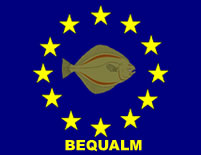 |
 |
||||
EU Funded Research Programme
The Biological Effects Quality Assurance in Monitoring Programmes (BEQUALM) project, initiated in 1998, was funded by the European Union through the Standards, Measurements and Testing programme of the European Commission. It was set up as a direct response to the requirements of the Oslo and Paris Commission (OSPAR) to establish a European infrastructure for biological effects Quality Assurance/Quality Control, in order that laboratories contributing to national and international marine monitoring programmes, such as the OSPAR Joint Assessment and Monitoring programme (JAMP) and the Co-ordinated Environmental Monitoring Programme (CEMP) can attain defined quality standards.
The ultimate aims of BEQUALM were to:
- produce an agreed set of protocols for biological methods used in marine monitoring,
- obtain conformity on acceptable limits of variation for each method
- develop a system for monitoring the output of Participating Laboratories and assessing their compliance with appropriate quality standards
- develop a QA system which is self-financing on the basis of fees recovered from participants.
Nine project partners, experts in particular biological effects monitoring techniques, organised a series of intercalibration exercises and training workshops to develop the QA infrastructure. The workpackages organised were: water and sediment bioassays, metallothionein measurement, ALA-D activity, DNA adduct measurement, P4501A activity, imposex/intersex measurement, lysosomal stability, liver histopathology and external disease measurement, chlorophyll-a and phytoplankton assemblage analysis and benthic community analysis.
The results indicated that many of the techniques are sufficiently robust to be used more widely in monitoring programmes such as the OSPAR Joint Assessment and Monitoring Programme and the Co-ordinated Environmental Monitoring Programme.